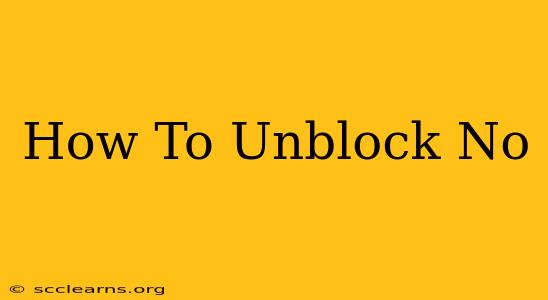How to Unblock Websites: A Comprehensive Guide
Are you frustrated by website blocks? Whether it's at work, school, or due to geographical restrictions, accessing your favorite sites can be a real headache. This guide will explore various methods to help you unblock websites, focusing on safe and effective techniques. We'll cover everything from simple browser adjustments to more advanced solutions.
Understanding Website Blocks:
Before diving into solutions, it's important to understand why websites are blocked. Common reasons include:
- Network Restrictions: Your workplace, school, or internet service provider (ISP) may actively block certain websites deemed inappropriate or unproductive. These blocks are typically implemented at the network level.
- Geographic Restrictions: Some websites only allow access from specific countries or regions. This is often due to licensing agreements, legal restrictions, or content regulations.
- Government Censorship: In some countries, governments censor websites considered subversive or harmful.
Methods to Unblock Websites:
Now, let's explore the various methods you can use to bypass these restrictions. Remember to always be mindful of the legal and ethical implications of accessing blocked content.
1. Using a Virtual Private Network (VPN):
A VPN is arguably the most effective way to unblock websites. A VPN masks your IP address, making it appear as though you are browsing from a different location. This is particularly useful for overcoming geographic restrictions. Choosing a reputable VPN provider is crucial; many free VPNs lack security features and might even log your browsing activity.
- How it works: A VPN encrypts your internet traffic and routes it through a secure server in a different location. This hides your real IP address and allows you to access websites blocked in your current location.
- Pros: High level of security, bypasses most geographical restrictions, protects your privacy.
- Cons: Can slow down your internet speed, requires a subscription (for premium services).
2. Using a Proxy Server:
Similar to a VPN, a proxy server acts as an intermediary between your computer and the website you're trying to access. It changes your IP address, allowing you to bypass some blocks. However, proxy servers are generally less secure than VPNs.
- How it works: Your internet requests are routed through the proxy server, masking your IP address.
- Pros: Relatively simple to set up.
- Cons: Less secure than VPNs, can be slow, and some websites may detect and block proxy servers.
3. Using a Tor Browser:
The Tor browser is designed to enhance anonymity and privacy online. It routes your internet traffic through multiple servers, making it difficult to trace your location or browsing activity. While effective for bypassing censorship, Tor can be significantly slower than a VPN and may not be suitable for all websites.
- How it works: Your traffic is encrypted and passed through a series of volunteer-operated servers, obscuring your origin.
- Pros: Strong anonymity, effective against censorship.
- Cons: Significantly slower speeds, potential security risks if not used correctly.
4. Changing your DNS Settings:
Your DNS (Domain Name System) settings translate website addresses (like www.example.com) into IP addresses. Some DNS providers offer features that can help bypass certain website blocks. Public DNS services like Google Public DNS or Cloudflare DNS might provide better access than your ISP's default DNS.
- How it works: You change the addresses of your DNS servers to those of a different provider.
- Pros: Relatively simple to implement.
- Cons: Effectiveness varies depending on the type of block in place.
5. Using a Web Proxy Website:
Many websites offer free web proxy services. These services act as intermediaries, masking your IP address. However, exercise caution when using free web proxy services as they may be less secure and potentially track your browsing activity.
- How it works: You enter the URL of the website you want to access through the proxy website.
- Pros: Easy to use, no software installation required.
- Cons: Less secure than VPNs or Tor, potential privacy risks, may be unreliable.
Choosing the Right Method:
The best method for unblocking websites depends on the type of block and your specific needs. For the strongest security and privacy, a reputable VPN is often the preferred choice. For simpler blocks, changing your DNS settings or using a public DNS service may suffice. Always be aware of the security implications and choose a method that best suits your circumstances. Remember to always respect the rules and regulations of the network you are using.

